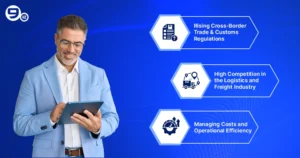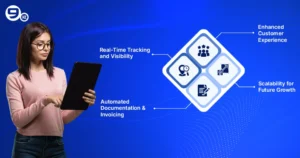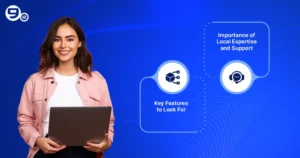What if a single delay could cause revenue loss? Yes, it can. In fact, a report indicates that 60% of small and medium-sized businesses (SMBs) have lost more than 15% of their revenue due to supply chain delays, and 79% of SMBs suffered due to supply chain disruptions in recent years. Although this is a worst-case scenario and a nightmare for a logistics business, a solution is custom logistics software, which offers more than off-the-shelf solutions available in the market.
UAE’s logistics businesses now understand that they need something to bridge the gap for sustainable growth, improved services, and greater delivery efficiency. From a market stats perspective, the GCC logistics software market size is projected to reach USD 1,747m by 2035 at a CAGR of 13.449% (2025-2035).In a report, the UAE Ministry of Economy stated that automation in logistics can reduce operational costs by up to 30%.
This push towards adopting digital solutions for logistics businesses in the UAE will reshape the future. It might be possible that your competitors have planned to invest in AI-driven supply chain software. If you are wondering, where should you start?
We have created this article for entrepreneurs and businesses seeking ultimate guidance on adopting custom logistics software in 2025. This guide will provide the information you need to successfully adopt a software solution for your transportation and logistics business.
The software you’ll develop will not be a tool; it will help you run your business successfully, make your customers happy, and improve your team’s productivity.
Let’s start with the blog!
Introduction to Custom Logistics Software in the UAE
Dubai and the United Arab Emirates host global businesses, and Logistics sits at the heart of the UAE economy. Ports, free zones, and airports connect Asia, Africa, and Europe in one tight network.
This is where Custom Logistics Software in the UAE steps in. It gives freight forwarders, 3PLs, and in-house teams a single view of orders, fleets, warehouses, and partners. Instead of consuming too much time on conventional systems, the data moves as fast as your cargo.
Custom software solutions are specifically designed to empower businesses, simplify potential challenges, and achieve efficiency in the fastest-evolving logistics and supply chain industry.
Growing Importance of Logistics in the UAE Economy
From oil dependency to economic diversification, the United Arab Emirates has positioned itself as a regional leader and global powerhouse in logistics and supply chain management. Dubai and the UAE’s logistics industry stand as one of the strong pillars of the GCC region’s economy. As the crossroads to the major continents Europe, Asia, and Africa, it is a natural and strategic hub for global trade routes.
For example:
- Jebel Ali Port (Dubai) and Khalifa Port (Abu Dhabi) are two of the busiest container ports in the world.
- Dubai International Airport works as the busiest airport worldwide.
- Free zones like Jebel Ali Free Zone (JAFZA), Dubai South, Dubai Airport Free Zone (DAFZA), and Abu Dhabi’s KIZAD make the UAE a heaven for logistics business owners.
Key growth drivers are: the eCommerce boom, regional trades, re-exports, government vision, and the adoption of technologies such as AI, blockchain, and automation into logistics.
Why 2025 Is a Turning Point for Supply Chain Digitalization
The world has come far from its previous state. Industries are evolving fast, technology is changing overnight, and customer demand is shifting rapidly. The logistics and supply chain industry is no exception and is under pressure to cater to the demand of worldwide businesses and their customers.
Optimize Your Logistic Process
Talk to a Logistic Expert
Request A Free Quote
The year 2025 is a turning point for supply chain digitization. Digital transformation is not only a competitive advantage but also a matter of business survival.
Key reasons for the 2025 shift are:
- The convergence of technology, such as AI, Machine Learning, IoT, Cloud Computing, and Blockchain, is now mature enough and ready for widespread adoption.
- Businesses are now interested in and investing in circular supply chains, energy optimization, ethical sourcing, and risk mitigation. So, sustainability and resilience are hot topics.
- Another key reason is the shift from a reactive to a proactive approach. In 2025, predictive analysis and autonomous supply chains will be in demand, helping businesses prevent over- or understocking and improving delivery services.
- Increased customer expectations are one potential reason to invest in supply chain digitization in 2025. The e-commerce boom has led customers to demand faster, personalized, and transparent services.
All these reasons are enough to convince businesses to digitalize logistics and supply chains, and the current year (2025) is the perfect time to do so. The only thing you need is AI-powered custom logistics software.
Also Read
How to Build a Logistics Management System?
Key Challenges UAE Businesses Face in Logistics
Every advantage has a trade-off. Although the UAE logistics industry leads worldwide, some specific challenges must be addressed to achieve greater efficiency and sustainable growth.
Let’s break down these!
Rising Cross-Border Trade and Customs Regulations
Trade flows occur worldwide, but regulations and the legal framework are diverse, leading to more paperwork, checks, and formalities. For example, HS codes, certificates, permits, and security filings must match every time. One mismatch can create an issue, and the shipment will be halted until everything is fine.
What businesses struggle with:
- Diverse rules by country and commodity
- Redundant data entry across portals
- Limited visibility on pre-clearance
- Costly delays
High Competition in the Logistics and Freight Industry
The logistics and freight industry is experiencing high competition because several businesses exist and are racing to target more customers. This has led to a rate war, but it does not ensure success. Service quality is the only thing that can earn a logistics firm trust, respect, and customers.
From the UAE’s market perspective, the reality is:
- Several logistics services providers offer similar costs
- Shippers demand real-time ETAs and proof of service
- Tenders ask for sustainability and compliance proof
- Niche cargo needs special handling and tracking
Managing Costs and Operational Efficiency
Labor costs, fuel costs, and fluctuating market demands create big challenges in terms of cost management and operational efficiency. Some businesses are still relying on traditional methods and legacy systems for tasks such as inventory management, route planning, etc., which downgrades efficiency.
Some common traps are:
- Deadhead kilometers and poor route planning
- Long dwell at yards and docks
- Human errors and delays
- Impact on fuel price due to global fluctuations
- Lack of real-time visibility
So, how can these challenges be countered? Developing custom logistics software is the only solution that can help businesses overcome all the challenges in one go. It can help you centralize all documentation, smartly validate HS codes, reduce paperwork, manage costs, achieve operational efficiency, and comply with global industry standards.
Why Custom Logistics Software Is the Solution
Although the UAE’s infrastructure serves as a backbone for logistics businesses, they need a digital solution to address rising challenges due to dynamic market demands and fierce competition. Off-the-shelf solutions are cost-effective but often fall short in addressing complexity and work on a fixed framework. Custom logistics software development is not only an advantage but a critical necessity for thriving businesses.
A custom-built system provides tailored features that are specifically developed to solve the localized pain points of a business, offering-
Tailored Features for the UAE’s Business Environment
Here are some of the key features of custom logistics and supply chain software, viewed from the perspective of the UAE’s business environment.
- Real-time Fleet Tracking
- Dynamic Route Optimization
- Multi-Warehouse Management
- Multi-Lingual Support
- Workflow Automation
- Last-Mile Delivery Intelligence
- Centralized Communication
The custom software provides tools for real-time tracking of shipments and the fleet. It enhances customers’ visibility and helps logistics providers ensure prompt deliveries.
AI-powered route optimization feature utilizes AI and machine learning to suggest the best routes, analyzing traffic and weather conditions.
The multi-warehouse and inventory management feature helps optimize inventories across facilities in JAFZA, KIZAD, and DAFZA. It can be done with a single dashboard.
Language is a barrier to international trade. Custom software solves this challenge by providing multilingual features(such as a custom dashboard supporting English, Arabic, and other languages) and a multi-client architecture so that businesses can easily deal with international customers.
Businesses can seamlessly integrate custom logistics software with local payment gateways, ERP systems, and e-commerce platforms. The workflow automation feature helps ease the business flows for the UAE’s omnichannel commerce and cross-border trades.
Last-mile delivery intelligence feature helps in navigating the unique addressing system and high-rise deliveries across Dubai and the United Arab Emirates.
Custom software can serve as a single, centralized platform for all communication. This eliminates the need for multiple phone calls and emails, as it allows dispatchers, drivers, and clients to communicate and share updates in real-time, all within a single application.
Integration with Local and Global Supply Chains
Rather than an off-the-shelf solution, custom logistics software solutions easily integrate with a wide range of platforms, such as global shipping carriers, third-party logistics providers (3PLs), and e-commerce platforms. The integration also ensures smooth data flow across the entire supply chain, reduces manual errors, and improves transparency.
For example, the custom solution can pull live data into the operational dashboard, allowing unparalleled visibility over high-priority shipments.
Take a Look…
How Much Does It Cost to Develop Logistics Software?
Improved Compliance with UAE Trade Regulations
One of the key advantages of custom software development is its ability to simplify the regulatory challenges.
Customs & Regulatory Compliance Automation
Streamlined custom documentation and compliance automation features help keep businesses updated with frequent changes in Dubai and the UAE’s import/export regulations. As a result, delays at ports and borders are minimized.
Adherence to Regional Law
Custom software solutions are easily programmable with trade regulations and updates, such as the UAE’s Maritime Pre-Load Cargo Information (MPCI) program. The adherence to the law using tailored logistics software helps a business to stay compliant, avoid fines, and prevent potential cargo seizures.
Audit Trail and Security
Enterprises can impeccably maintain data records, which helps authorities conduct easy and authentic audits of records. Additionally, the data remains highly encrypted, preventing cyber attacks and meeting the UAE’s stringent data protection laws.
So, now that things have cleared up, why should you invest in custom logistics software development for your business? But how do you make it real?
If this sounds like your next step, the NineHertz, as the best logistics software development company in the UAE, is your go-to partner. The company has a proven track record in delivering engineered solutions for simplifying business challenges and complying with the UAE’s logistics industry regulatory framework and adhering to local and global law.
Top Benefits of Custom Logistics Software for UAE Businesses
Pre-built solutions or generic tools offer limited features. But if you need workflow automation, dynamic route tracking, compliance ready system, and advanced features investing into custom logistics software development is worthwhile.
Here are some of its key benefits:
Real-time Tracking and Visibility
Using custom software, it’s easy to track the fleet through Live GPS, sensor data, and geofencing. From trucks to cold chains, everything is visible with a single click. Integration of GPS and IoT devices provides a granular view. Additionally, AI-powered dynamic route optimization features suggest the best routes, analyzing climatic and traffic conditions.
Automated Documentation and Invoicing
More operations lead to more documentation, especially when using legacy systems. Errors, delays, and administrative costs are also disadvantages. Custom software automates the documentation process, reducing maximum paperwork and supporting businesses in creating invoices, certificates of origin, and other documents automatically.
Enhanced Customer Experience
In a highly competitive Dubai and UAE’s logistics and supply chain market, enhanced customer experience must be a prime goal of a business. Custom logistics software empowers businesses to provide a seamless and transparent service that meets high expectations.
Consumers can track their shipments in real-time, receive updates, and access historical data,by using a dedicated self-service portal. This enhances the level of transparency, builds trust and loyalty among customers, and improves the productivity of your support & service team.
Scalability for Future Growth
The UAE’s economy is growing rapidly, and businesses need a solution that can help them grow. If we compare, off-the-shelf software comes with limitations, contrary a custom system is built for scalability.
It can be designed with a modular architecture that allows you to easily add new features, integrate with new systems (like ERPs or new e-commerce platforms), and handle workflows. This flexibility ensures that your software remains a strategic asset for years since you invest in it.
How Custom Logistics Software Supports the UAE’s 2030 Vision
UAE’s 2030 vision is to diversify the economy beyond oil & gas, promoting innovation using technological advancements. The mission is to achieve sustainable development in the upcoming years. The custom logistics software directly supports the nation’s development goals that also includes Dubai Commercial Transport Strategy 2030 and the Net Zero by 2050 strategic initiative.
The digital transformation of logistics, transportation, and supply chain will not only help for cost reduction but also enhance the position of Dubai and the United Arab Emirates as a global trade hub. In essence, bespoke software solutions push UAE’s logistics infrastructure towards its 2030 objectives.
Enabling Smart Trade and Digital Transformation
The UAE’s vision for the future is built on a “digital-first” trade model where the custom logistics software will play a key role. Instead of using conventional methods, custom software creates a more efficient and transparent supply chain that aligns with the nation’s push for digital government services and smart cities. It streamlines logistics and supply chain operations by providing real-time visibility.
Logistics firms can directly integrate custom software with national digital platforms and use emerging technologies like blockchain to ensure secure and verifiable transactions. This level of digital integration will provide a competitive edge to the UAE’s logistics industry.
Supporting Sustainability and Green Logistics
UAE’s government is taking proactive initiatives for its Green Agenda 2030, and custom logistics software development is pivotal. It helps businesses with AI-driven demand forecasting, workflow automation, reducing paperwork, and energy-efficient warehouse management that reduces carbon footprint.
Some readers might have a question: How does custom software support green logistics?
Route Optimization– AI-driven route optimization helps reduce fuel consumption and traffic congestion, and minimizes travel distance.
WMS- Custom warehouse software supports energy-efficient management, inventory management to reduce waste, and eco-friendly packaging practices.
Demand Forecasting- Combining AI and Machine Learning, the demand forecasting module helps in overproduction, overstocking, and unnecessary transportation.
Carbon Footprint Tracking- Software can be developed to track, analyze, and report carbon emissions at every stage of the supply chain, promoting sustainability and enhancing data improvement.
Reverse Logistics Management- Product returns is one of the biggest reasons behind packaging wastage. Custom solutions can help in streamlining returns and recycling, reducing the waste and promoting circular supply chain practices.
Future Trends in Logistics Software for the UAE (2025 and Beyond)
The UAE’s logistics industry is progressing forward with its initiatives and investing in Industry 4.0 technologies such as IoT, AI, Machine Learning, 3D printing, and more.
Due to this, in the near future, Custom Logistics Software in the UAE will blend data from ports, fleets, warehouses, and customers into one smart layer. The software will predict demand, secure transactions, and automate more work on the ground. The winners will be the logistics and supply chain businesses that turn insights into action in minutes, not weeks, while staying compliant and cost-efficient.
So, let’s have a closer look at some future trends that will reshape the UAE’s logistics landscape.
AI and Predictive Analytics in Supply Chains
Artificial Intelligence (AI) and machine learning in logistics will revolutionize industrial processes by improving product design, warehouse automation, predicting equipment problems, and optimizing workflows. Companies will increasingly seek smart factory consulting services to accelerate adoption. AI will also help companies be more agile and responsive to problems.
Blockchain for Secure and Transparent Transactions
Blockchain technology is known for providing security and ultimate transparency. Thus, logistics businesses will leverage it for secure transactions, enhanced traceability, and smart contracts.
For example, Immutable ledgers prevent fraud, smart contracts will help with payment automation and compliance process, enhancing transparency.
IoT and Smart Warehousing
IoT(Internet of Things) and smart warehousing is about connecting warehouse equipment with the internet and collecting data through sensors and RFID devices. With the help of IoT, it is easy to check things like temperature and humidity, especially when a business is dealing with perishable goods. The combination of IoT and smart warehousing will help businesses with inventory management, warehouse automation, condition monitoring, and predictive maintenance.
Choosing the Right Custom Logistics Software Partner in the UAE
The success of custom logistics software will depend on who will develop it. For most of the businesses, it is impossible to hire in-house developers for just developing a logistics software. The better idea is to pick a trusted logistics software development company that has experience in delivering state-of-the art solutions.
Thus, what should you look for when selecting the right partner? Here it is-
Key Features to Look For
Customization and Scalability
choose technology partners experienced in delivering custom solutions that scale with the growing logistics business and operational needs.
Regulatory Compliance
The logistics software development company must be aware of local and global regulatory compliance related to the logistics, shipping, and supply chain industry.
Seamless Integration
The development team must be experienced in creating solutions that can be easily integrated with payment gateways, ERP systems, and third-party apps.
Advanced Features
Developers must be able to create AI-driven features that can enhance operational efficiency such as AI-powered route planning, demand forecasting, real-time fleet tracking, and more.
Security
The vendor must ensure robust data protection and encryption to prevent cyberattacks on sensitive business and customer data.
Track Record
The custom logistics software development company must have a proven track record in delivering robust solutions aligning with similar ideas for which you want to work for.
Importance of Local Expertise and Support
When selecting the right technology partner for bespoke logistics software development, prioritize on-the-ground expertise and support to cater to the demand of Dubai and UAE’s logistics businesses. A UAE-based team understands free-zone moves, local delivery patterns, and customer expectations in Dubai, Abu Dhabi, and the Northern Emirates.
So, if your technology partner has local expertise, they would be able to craft the solutions that are compliance ready and fulfill business’s demands accurately.
Conclusion
In the year 2025, the customer demands are high and logistics businesses are under pressure to provide seamless services, keeping customer satisfaction on top priority. On the other hand, sustainable and green logistics practices are demanding to match UAE’s 2030 vision and Net Zero by 2050 initiative. Custom platforms are the only solution to simplify all the challenges.
Why is investing in custom logistics software essential now?
UAE’s logistics market is evolving fast and traditional solutions don’t work well anymore. Companies need faster, smarter, and sustainable solutions that not only help in conquering existing goals but also the future goals. That is why investing in custom logistics software is essential now.
Optimize Your Logistic Process
Talk to a Logistic Expert
Request A Free Quote
A custom logistics software is built to suit specific needs and simplify the challenges to achieve greater efficiency, reducing administrative overheads, fuel consumption, and costs. In a competitive market like the UAE, having a system that makes you more efficient and reliable is not just a good idea, it’s a necessity for future success.
FAQs
Why do UAE businesses need custom logistics software in 2025?
In 2025, the UAE’s market is more competitive, global trades are moving faster and customers’ expectations are high. Custom logistics software can help you tackle all the challenges innovatively in 2025 such as managing complex supply chains, complying to the regulations, and streamlining the supply chain operations including green initiatives.
How is custom logistics software different from ready-made logistics solutions?
Pre-built solutions offer fixed features and one can’t fit for all is a universal truth. Compared with the off-the-shelf logistics software, custom logistics software suits specific needs and is designed to solve unique challenges a business has.
What industries in the UAE benefit most from custom logistics software?
A multitude of industries benefit from custom logistics software, such as:
- Retail & eCommerce
- Manufacturing
- Transportation
- Healthcare
- Oil &Gas
- Food and groceries
- Perishable logistics
What are the key benefits of using custom logistics software in Dubai and the UAE?
The key benefits of using custom logistics software in Dubai and the UAE are:
- Streamlined workflows
- Enhanced efficiency
- Cost reduction
- High customer satisfaction
- Improved visibility
- Scalability
- Adhere to local and international standards
Great Together!













